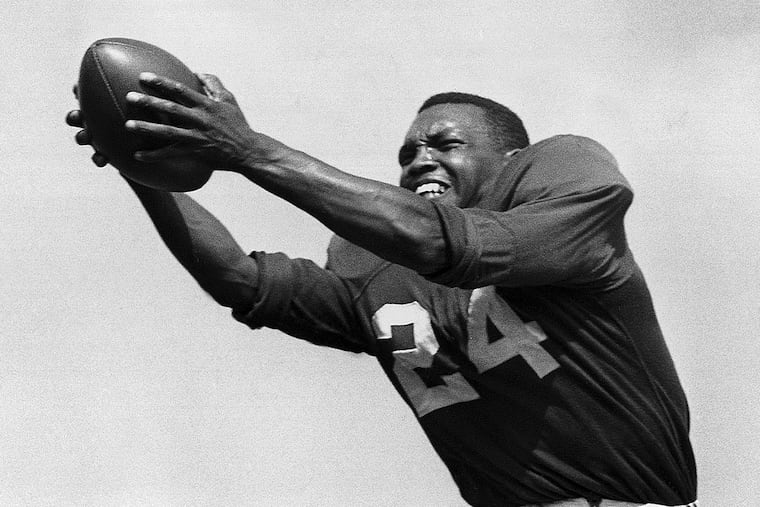Penn State to wear helmet decal honoring Wally Triplett, who broke the color barrier in the Cotton Bowl in 1948
Triplett, a Cheltenham High School graduate, and teammate Dennie Hoggard were the first African-Americans to play in the Cotton Bowl.

DALLAS – Although Penn State hasn’t played in the Cotton Bowl in 45 years, the Nittany Lions always have felt a special connection to the game because of the history they made there when two of their players broke the color barrier in 1948.
Running back Wally Triplett, a graduate of Cheltenham High School, and teammate Dennie Hoggard became the first African-American players to compete in the Cotton Bowl. Because of their color, they were not allowed into Dallas hotels, and the team stayed at a Naval Air Station 14 miles outside of the city.
To commemorate the occasion on Saturday against Memphis, Penn State will wear a special decal on the backs of their helmets to honor Triplett’s legacy and impact on the bowl. The decal sports the initials “WT” and includes “We Are” at the top and “1948” on the bottom.
Penn State head coach James Franklin, who did not speak specifically about the helmet decal since it had yet to be announced before his news conference on Friday, called Triplett’s groundbreaking game “some pretty cool history.”
“We’re going to do something during the game to try to honor our history with that as well on our uniforms,” he said.
“I think it’s a great opportunity to obviously make sure our focus is on the Cotton Bowl and the great opponent that we have in Memphis, but also to be able to take some time and talk about history – history of our game of football, history of our specific universities, history of the Cotton Bowl, and more importantly history of our country and how far we’ve come in a short period of time. But there is also probably still some work that needs to be done that everybody recognizes.”
Triplett scored on a 6-yard catch against Southern Methodist in the 1948 Cotton Bowl, which ended in a 13-13 tie and enabled Penn State to finish the season 9-0-1 and ranked fourth in the country. He was inducted into the bowl’s Hall of Fame in 2018.
Triplett, also the first African-American football player from Penn State drafted by an NFL team, died Nov. 8, 2018 at his home in Detroit.
Penn State wide receiver KJ Hamler, who is from the Detroit suburb of Pontiac, Mich., said last week that he researched information on Triplett “just to know the background of it and how important this game is really for Penn State.
“So it’s very unique and just honoring Mr. Wally Triplett, I think it’s going to be a great time to prove ourselves,” he said.
The Triplett episode is believed in some circles to be the source of Penn State’s “We Are” chant. When the team had to decide whether he and Hoggard would be left behind rather than accompany the team to segregated Dallas, team captain Steve Suhey declared, “We are Penn State, there will be no meetings.”
However, Penn State historian Lou Prato said his research showed that “We Are” did not become popular until the mid 1970s when cheerleaders created the cheer.